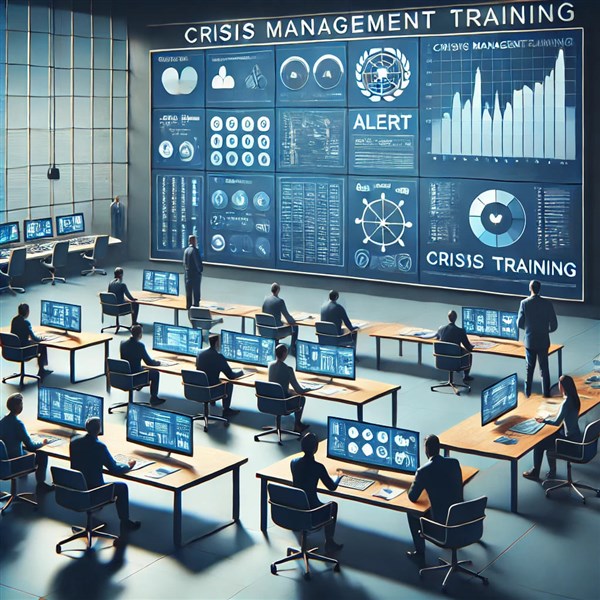Unable to find what you're searching for?
We're here to help you find it
In today's fast-paced, unpredictable world, crises come in many forms—natural disasters, data breaches, supply chain breakdowns, public relations issues, or even a global pandemic. What separates resilient organizations from those that falter is not the presence or absence of a crisis, but how prepared their teams are to respond effectively.
This is where crisis management training becomes invaluable.
Crisis management training equips teams with the tools, mindset, and frameworks necessary to navigate high-stress, high-stakes scenarios. It ensures your team not only survives a crisis but emerges stronger, more coordinated, and more confident.
In this blog, we’ll explore the top reasons to invest in crisis management training for your team—from improving communication and leadership to reducing risk and enhancing organizational resilience.
One of the most critical benefits of crisis management training is that it fosters a proactive, rather than reactive, mindset. Instead of scrambling when disaster strikes, trained teams know how to assess risks, prepare response plans, and act with clarity.
🧠 What You’ll Learn:
✅ Why It Matters:
A culture of preparedness empowers employees to act quickly and decisively, minimizing confusion, panic, and costly delays.
During a crisis, every second counts. Miscommunication and lack of coordination can make a bad situation worse. Crisis management training emphasizes cross-functional teamwork and defined roles.
🧠 What You’ll Learn:
✅ Why It Matters:
When everyone knows their role and trusts the plan, your response becomes faster, smoother, and more effective—even in high-stress conditions.
Communication can either calm a storm or intensify it. Training ensures your team understands how to craft and deliver the right messages—to internal teams, the public, and stakeholders—during a crisis.
🧠 What You’ll Learn:
✅ Why It Matters:
Good communication protects your brand reputation, reassures employees and customers, and reduces misinformation during emergencies.
In times of crisis, people look to leadership for guidance. A well-trained leader can mean the difference between chaos and calm. Crisis management training develops leadership qualities like decision-making, resilience, and emotional intelligence.
🧠 What You’ll Learn:
✅ Why It Matters:
Strong crisis leadership helps teams stay focused, motivated, and organized, even in the face of adversity.
Crisis management training often integrates with business continuity and disaster recovery. It teaches your team how to keep essential operations running and recover faster from disruptions.
🧠 What You’ll Learn:
✅ Why It Matters:
The faster your business can bounce back, the fewer the losses—both financial and reputational.
Every crisis poses a risk to operations, revenue, and even legal compliance. With training, your team can take proactive steps to mitigate impact and avoid escalation.
🧠 What You’ll Learn:
✅ Why It Matters:
By reducing downtime and minimizing damage, trained teams help the company avoid millions in potential losses.
When employees are trained to handle crises, they feel more secure and valued. They know what to expect, what to do, and how to protect themselves and others.
🧠 What You’ll Learn:
✅ Why It Matters:
Confidence in a crisis translates to calm, efficient action, boosting team morale and reducing mental stress.
How your organization handles a crisis will shape how stakeholders—customers, partners, investors, and the public—perceive your brand. A smooth, transparent response shows leadership and integrity.
🧠 What You’ll Learn:
✅ Why It Matters:
One poorly managed incident can tarnish a brand for years. Training ensures your response is measured, empathetic, and aligned with your values.
Crisis response is not a “one and done” event. Plans must be updated, tested, and improved regularly. Crisis training teaches teams how to run simulations and apply lessons learned.
🧠 What You’ll Learn:
✅ Why It Matters:
Regular training ensures your crisis plan evolves with the times—keeping it relevant, practical, and actionable.
Many industries—like healthcare, aviation, education, finance, and energy—have mandatory crisis preparedness requirements. Training helps your organization meet those standards.
🧠 What You’ll Learn:
✅ Why It Matters:
Compliance avoids legal penalties, protects stakeholders, and helps your company stay in good standing with regulators and the public.
Conclusion
Crises are inevitable. But chaos doesn’t have to be.
Investing in crisis management training ensures your team is prepared to respond with speed, clarity, and resilience—reducing damage, protecting lives, and safeguarding your company’s reputation.
It’s not just about risk mitigation. It’s about building a culture of readiness—where your people are confident, your operations resilient, and your leadership trusted.
Whether you're a small business, a multinational corporation, a school, or a nonprofit, now is the time to make crisis preparedness part of your strategy.
When it comes to crisis management training, Koenig Solutions is a leading choice. As a top IT training company, we offer a comprehensive range of courses that equip your team with the skills to manage crises effectively. Our courses are designed to meet the needs of various industries and are taught by experienced professionals. With our training, you can ensure your team is prepared for any crisis that comes their way.
Invest in your team's future and the continuity of your business by enrolling in our Crisis Management Training courses today.

Aarav Goel has top education industry knowledge with 4 years of experience. Being a passionate blogger also does blogging on the technology niche.










